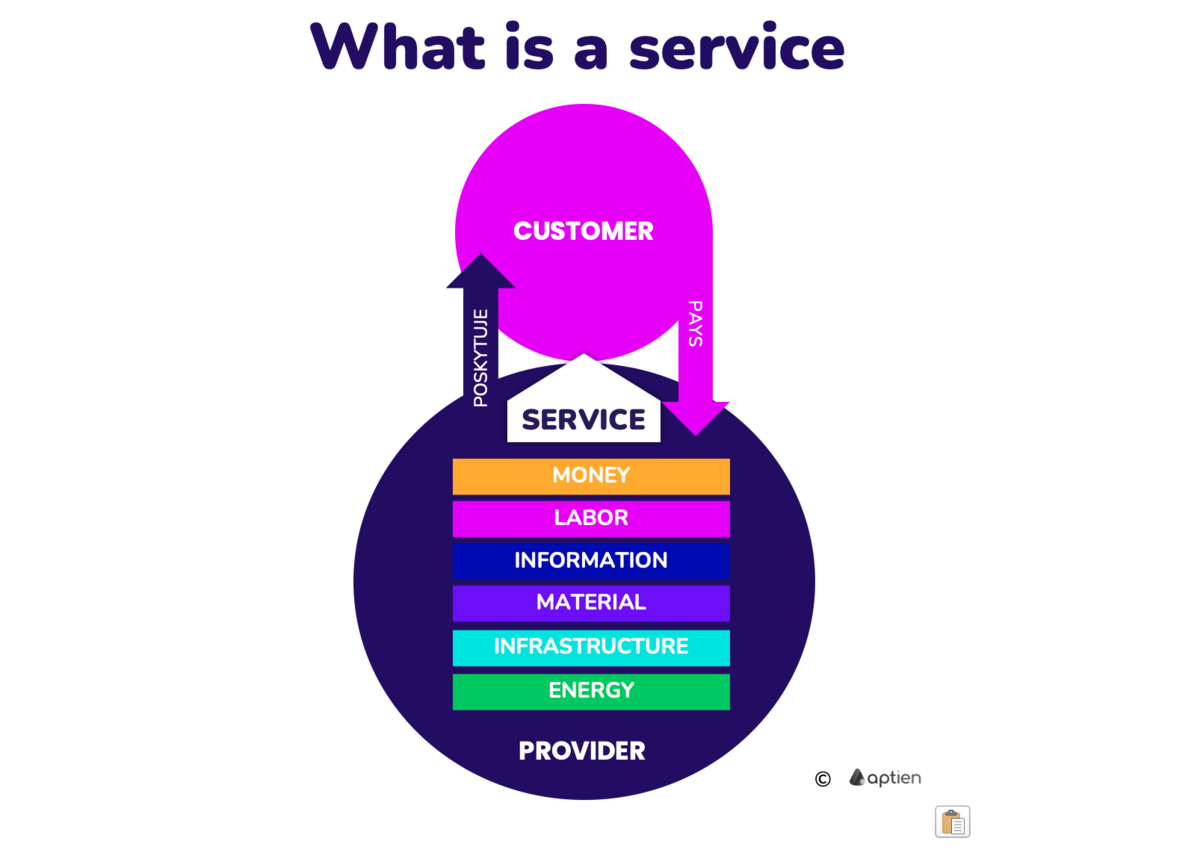What is a Service? A Simple Explanation
- A service is the work done or resources provided by a service provider that delivers value to the customer.
- When you talk about a service, you’re referring to the result you’re buying or offering, depending on whether you’re the customer or the provider.
Why do Businesses Need to Understand Services?
- Businesses buy services because it’s often more cost-effective or necessary than doing everything in-house. Purchased services are expenses.
- Businesses also offer services to their customers, either as their main product or alongside products. These services generate income.
- Businesses rely on various internal support services to keep operations running smoothly. These services ensure the company runs efficiently.
Basic Characteristics of a Service
- Customer: Every service is provided to a customer who benefits from its value.
- Provider: Every service has a provider responsible for delivering it.
- Intangibility: A service is an intangible output of processes and activities that must have value for the customer.
- Non-Storage: Unlike goods and products, services cannot be stored.
- Output of Work and Processes: Services are the result of business processes, work or provided resources (finances, information, assets, infrastructure, software, etc.).
- Consumption of Inputs and Resources: A service always consumes inputs and resources (financial, informational, human labor, material, and assets) and transforms them into value for the customer.
- Measurement of Value and Quality: The value and quality of a service are measured and managed using indicators (Service Level).
What are 10 common services typically found in small and medium-sized businesses
- IT Support & Managed Services: Includes software maintenance, network security, and tech support.
- Human Resources (HR) Services: Recruitment, payroll, employee management, and compliance support.
- Accounting & Bookkeeping: Financial reporting, tax preparation, and payroll processing.
- Marketing & Advertising: Digital marketing, social media management, SEO, and branding.
- Customer Support & Helpdesk: Call centers, chat support, and troubleshooting services.
- Legal & Compliance Services: Contracts, business regulations, and intellectual property management.
- Logistics & Delivery Services: Warehousing, shipping, and order fulfillment.
- Facilities & Maintenance Services: Office cleaning, equipment repair, and security.
- Consulting & Business Advisory – Strategic planning, financial consulting, and operational efficiency.
What the Company Needs to Manage the Purchased Services?
Service Description and Scope & Service Level Agreement (SLA)
- What the service includes, key deliverables, and how it benefits the company
- Guaranteed uptime, service quality, and response times
Service Provider (Vendor or Supplier)
- Company name, main contact person, phone number, and email address
Pricing and Billing
- Service cost and billing method (monthly, yearly, hourly, per user, etc.)
Contract Terms
- Contract duration, notice periods, and automatic renewal details
How to Change or Cancel the Service
- Steps to activate, use, pause, or cancel the service
Compliance with Laws and Regulations
- Whether the service complies with legal, security, and industry standards
Company’s Point of Contact
- Person responsible for managing the service and monitoring its performance, quality, and SLA adherence
Risks and Impact of Service Interruptions
- Effects of service downtime on business operations and available backup options
Service History and Documentation
- Date the service started, any changes made, important notes, milestones, and records of communication with the vendor
How Aptien Helps You With Service Management
Aptien.com offers a comprehensive suite of tools designed to help small and medium-sized businesses (SMBs) manage their services effectively. Here are some key ways Aptien can assist with service management:
1. Vendor Management
2. IT Service Management
3. Service Management
- Centralized Service Catalog: The platform offers a service catalog feature, which helps you organize and manage the services you offer. Keep detailed records of all services provided, including contracts, tasks, and associated resources.
- Service Desk and Support: Aptien includes features for managing service desks, allowing you to handle customer inquiries and support requests efficiently.
- Service Catalog: This makes it easier for customers to understand what services are available and for your team to manage them.
- Service Dependency Management: Aptien helps you track and manage the resources required for delivering services, such as information, assets, and infrastructure. This ensures that you have the necessary resources available when needed.
- SLA Management: The platform allows you to measure and manage the value and quality of your services using various indicators, such as Service Level Agreements (SLAs).
- Collaboration and Communication: Aptien facilitates better collaboration and communication within your team and with customers. This helps in coordinating efforts and ensuring that everyone is on the same page.
By leveraging these features, Aptien.com can help SMBs enhance their service management processes, leading to improved customer satisfaction and operational efficiency.
